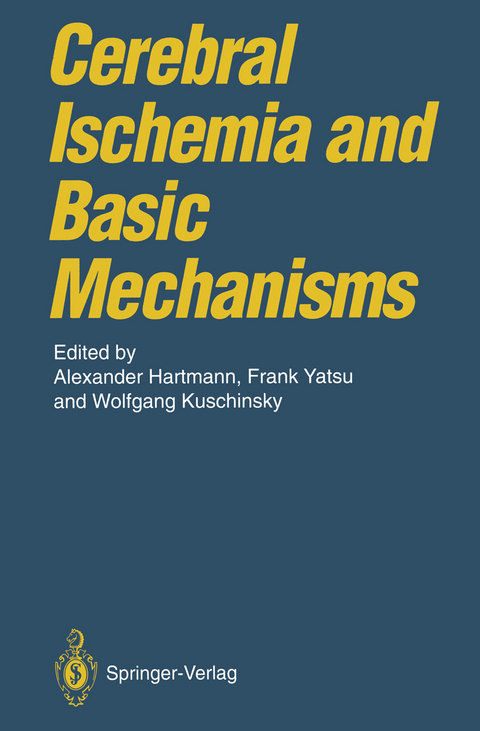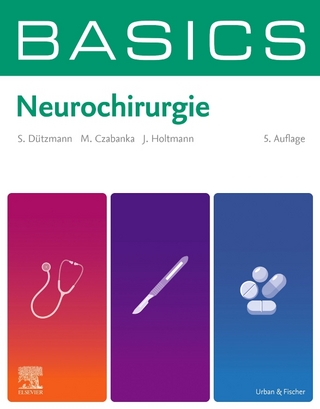
Cerebral Ischemia and Basic Mechanisms
Springer Berlin (Verlag)
978-3-642-78153-7 (ISBN)
Alexander Hartmann, geboren 1985, ist einer der erfolgreichsten Mentalisten Europas und Deutschlands jüngster Top100 Keynote-Speaker. Seinen großen Durchbruch schaffte er in der Pro7 Sendung "The next Uri Geller". Inzwischen hat er seine eigene TV-Show, hält regelmäßig Vorträge und Seminare, hat ein eigenes Hypnosezentrum gegründet und sich als Experte für das Thema Unterbewusstsein etabliert. Der deutsch-englische Muttersprachler ist mit seinen Seminaren und Vorträgen auch international sehr gefragt. Er lebt und arbeitet in Stuttgart.
The Window of Opportunity for the Treatment of Cerebral Ischemia.- The Window of Opportunity for the Treatment of Cerebral Ischemia.- Energy Metabolism.- Uncoupling of Flow and Metabolism in Early Ischemic Stroke.- Recovery from Motor Stroke: Different Patterns of Functional Reorganisation in Individual Patients.- Head Injuries: A Target for Neuroprotection.- Changes in the Biophysical Environment of Water Following Focal Brain Ischemia in the Rat.- Acidosis.- Aspects of Acid-Base Homeostasis in Ischemia.- Acidosis: A Marker for Penumbra or a Target for Treatment?.- Astrocytic H+ and Ca2+ Changes: Implications for Ischemic Brain Injury.- Anoxic Injury of Central Myelinated Axons: Nonsynaptic Ionic Mechanisms.- In Vivo Nuclear Magnetic Resonance Observation of Cerebral Metabolism.- Effects of Extracellular Acidosis on Glial Cell Intracellular pH: Evidence for a Glial Spatial H+ - Buffering Mechanism?.- Intracellular Messengers.- Calcium Channel Blockers Prevent Delayed Cerebral Ischemia After Intracranial Aneurysmal Subarachnoid Hemorrhage.- Monosialoganglioside GM1 in Experimental Models of Stroke.- What Are We Learning from Clinical Trials in Acute Cerebral Ischemia?.- Threshold of Calcium Influx After Global and Focal Ischemia: Implications for the Window of Therapeutic Opportunity.- Non-NMDA Glutamate Receptors in the Regulation of Neuronal Ca2+ and Excitotoxicity.- Phenylalkylamine Calcium Antagonists as Cerebroprotective Agents.- Intracellular Messengers After Ischemia.- Influence of NMD A Receptor Antagonists on Glycine Receptor Isoform Expression in Spinal Cord Cultures.- Effects of Calcium Antagonists on Experimentally Induced Carotid Intimal Proliferations.- Excitatory Amino Aids and Excitotoxicity.- Unsettled Role of Glutamate/Glutamate Receptors in Ischemic Excitotoxic Neuronal Damage.- Neuroprotective Effects of 5-HT1A Receptor Agonists.- In Vitro Ischemia in the Hippocampal Slice.- Glial Swelling and Damage by Arachidonic Acid.- Free Radicals, Protein Synthesis.- Disturbances of Cerebral Protein Synthesis in Global and Focal Ischemia.- Neurotrophin Expression and Gene Regulation in a Focal Cerebral Ischemia Model in the Rat.- Nitroarginine Reduces Infarction After Middle Cerebral Artery Occlusion in Rats.- No Appreciable Swelling of Cultured Neurons After Oxygen Deprivation, and Cell Damage Occasionally Aggravated by Oxygen Resupply.- Gene Expression.- Changes in Gene Expression After Brief Ischemic Insults as Potential Mediators of Induced Tolerance: Postischemic Temperature as a Variable Affecting the Stress Response.- Heat Shock Gene Expression as a Marker of Ischemic and Other Types of Injury.- Gene Expression and Functional Changes After Acute Ischemia: Age-Related Differences in Outcome and Mechanisms.- Models of Neural Circuit Reorganization After Injury.- Clinical Relevance of Gene Expression in Cerebral Ischemia.- Leukocytes, Microcirculation, and the Coagulation System.- Mechanisms of Leukocyte-Mediated No-Reflow and Tissue Injury in the Microcirculation.- Microcirculatory Changes in Cerebral Ischemia.- Current Evidence on a Pathophysiological Function of Leukocyte /Endothelial Interactions in Cerebral Ischemia.- Do Leukocytes Contribute to the Brain Lesion That Begins When an Intracranial Artery Is Occluded?.- Contribution of Neutrophils to Ischemic Brain Damage.- Polymorphonuclear Leukocyte Adherence and Microvascular Reflow After Focal Cerebral Ischemia/Reperfusion.- Activation of the Coagulation System and Concomitant Impairment of White Cell Rheology in Patients with Acute Cerebral Infarction.- Microcirculatory Disturbance and Leukocytes: Influence of Leukocyte-Produced Superoxide on Red Blood Cell Aggregation.- Small Volume Resuscitation in Hemorrhagic Shock by Hycellupertonic/Hyperoncontic Saline-Dextran: Effects on the Central Nervous System.- Effects of Pentoxifylline on Recovery from Cerebral Ischemia and Reperfusion Injury.- Regional Cerebral Blood Flow in Acute Stroke: Comparison of Two Calcium Antagonists.
| Erscheint lt. Verlag | 16.12.2011 |
|---|---|
| Zusatzinfo | XIV, 443 p. |
| Verlagsort | Berlin |
| Sprache | englisch |
| Maße | 155 x 235 mm |
| Gewicht | 697 g |
| Themenwelt | Medizinische Fachgebiete ► Chirurgie ► Neurochirurgie |
| Medizin / Pharmazie ► Studium | |
| Naturwissenschaften ► Biologie ► Humanbiologie | |
| Schlagworte | Aneurysm • brain • Brain Injury • Cerebral ischemia • ischemic stroke • Myelin • nervous system • Neurology • neurons • Neurophysiology • Neuroprotection • neurosurgery • Nuclear Magnetic Resonance (NMR) • Physiology • spinal cord |
| ISBN-10 | 3-642-78153-5 / 3642781535 |
| ISBN-13 | 978-3-642-78153-7 / 9783642781537 |
| Zustand | Neuware |
| Informationen gemäß Produktsicherheitsverordnung (GPSR) | |
| Haben Sie eine Frage zum Produkt? |
aus dem Bereich


